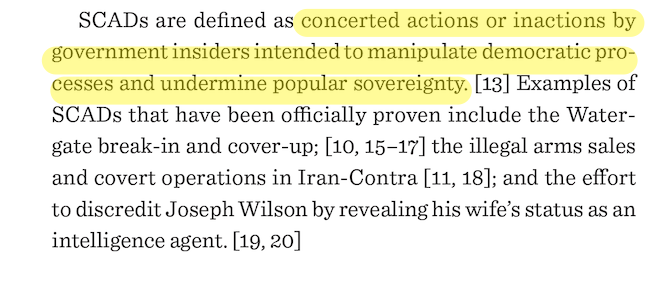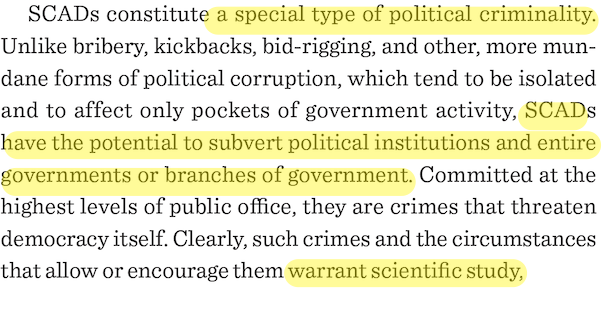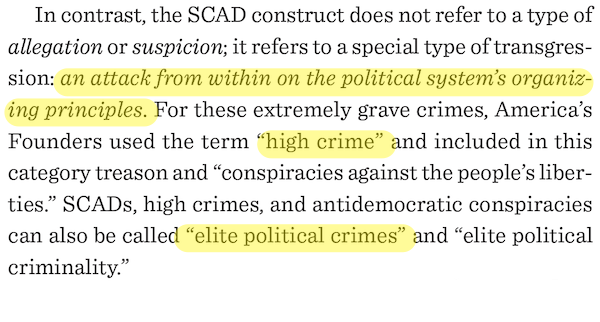By Lambert Strether of Corrente.
“Well, Doctor, what have we got—a Republic or a Monarchy?” “A Republic, if you can keep it.” —Benjamin Franklin to Elizabeth Willing Powel of Philadelphia, 1787.
The Durham Report (“Report on Matters Related to Intelligence Activities and Investigations Arising Out of the 2016 Presidential Campaigns “) is sprawling, and as we might expect, the characters in the cast are all as twisty as corkscrews (and unlikely to be indicted, which must be a relief to everyone who is anyone).
For clarity, I will put a thesis to the readership: What the Durham Report (DR) documents, but does not name, is a change in the Constitutional order. As we know, the Professional-Managerial Class (PMC) is the Democrat base (see Thomas Frank). The PMC achieved class consciousness in 2016, triggered by Trump’s victory (and Clinton’s defeat). They then collectively declared a state of exception — as sovereigns or would-be sovereigns are wont to do — where anything that would defeat Trump was licensed (a “permission structure,” as we say; here is an early example). In the process, the hegemonic elements of the PMC fused Democrat Party operatives, the organs of state security, and the press into a single, Flexnet-like Faction (I use the word “Faction” deliberately) that had the objective of retaining its own power by delegitimizing an elected President, an object it in part achieved. This Faction[1] has dominated the governing class[2] of the United States since 2016, and has a good shot of retaining power permanently (assuming the United States remains a single political entity). The result is a new, and distinctly anti-democratic, Constitutional order that is no way a Republic as the Framers understood the term. The Durham report is a window into the initial stages of the process I have just described.
Sadly, I will not be able to document all the elements of that thesis today. I would love to distentangle one of the more complicated subplots outlined in the Durham Report — say, the Steele dossier, where the FBI initiated an investigation into the Trump campaign based on unvetted and uncorroborated information — but it would take Balzac-like skills for me to do that, and I don’t have them, or the time. Rather, I will focus on a Durham Report subplot that shows the claim that is central to my thesis: Faction > Constitutional Order: “The Clinton Plan.” Let’s now turn to the report.
The “Clinton Plan”
The provenance and definition of “the Clinton Plan.” DR, p. 81:
“Vilify,” eh? Looks like that intelligence was pretty good!
The relevance of the Clinton Plan to the investigation. DR, p 82:
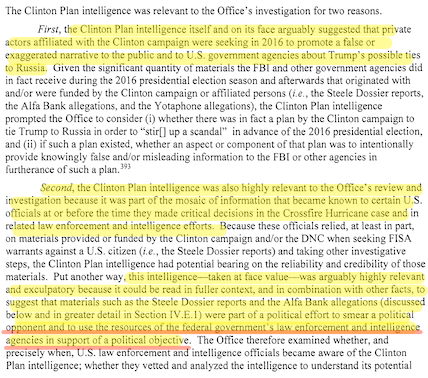
I would say that determining whether materials like the Steele Dossier oppo and that sought “to use the resources of the federal government’s law enforcement and intelligence agencies in support of a political objective” would be pretty important! Especially if, oh, checks and balances are important to you….
Apparently, our organs of state security thought so, too, because the “Clinton Plan” went straight to the White House:
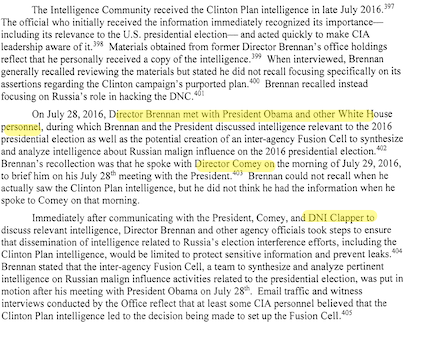
(DR doesn’t say whether Obama, or indeed anybody else, was surprised by the intelligence; it’s not unreasonable to think they knew all about it already.)
The “Clinton Plan” was then buried. DR, 87:

(Again, note the contrast to the Steele dossier’s handling.)
It’s hard to characterize burying the Clinton Plan as anything other than a derelection of duty, DR, p. 97:
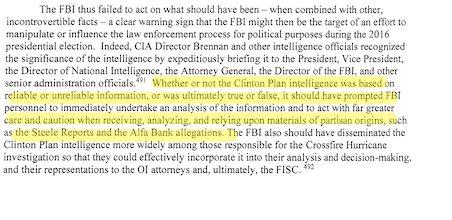
One can only wonder why this happened! DR, p. 81:
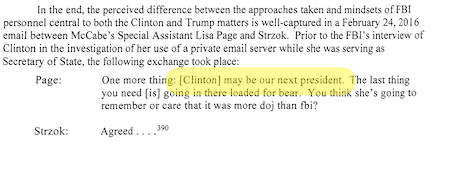
‘Tis a mystery! DR, p 9:

Of course, it would be interesting to know if the Clinton campaign put the Clinton Plan into effect (very much including “the resources of the federal governement’s law enforcement and intelligence agencies in support of a political objective”). Durham spends many pages on circumstantial evidence that they did just just that, but then he talked to Clinton World, too:
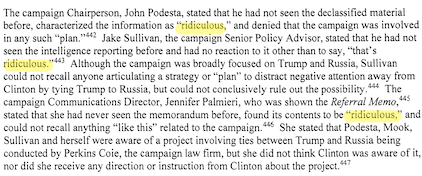
“Ridiculous!” “Ridiculous!” “Ridiculous!” Why, it’s almost as if Podesta, Sullivan, and Palmieri were working off the same talking points memo, isn’t it?
One would think that the material from DR pages 81 (“Clinton may be our next President”) and 9 (“someone who should lose to Clinton”) would show that the FBI investigation, at least, had been captured by Faction, but let’s look at the matter a little more deeply.
The Victory of Faction
Durham attributes the FBI’s totally inexplicable inhumation of the Clinton Plan to “confirmation bias.” DR p. 303:
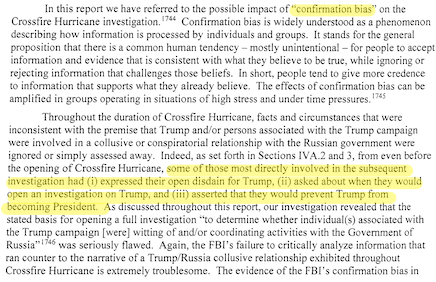
Besides letting rather a lot of spooks off the hook, “confimation bias” is a psychological, cognitive framing. Such framing does not address the direction of the bias, nor the selection of topics to be biased about (Strozok, for example, might well have been biased toward the Washington Wizards, and entirely neutral on politics). We need to move beyond the psychology of the individual and look at institutional factors.
Here, the work of James Madison in Federalist #10, also 1787, is relevant:
By a faction, I understand a number of citizens, whether amounting to a majority or a minority of the whole, who are united and actuated by some common impulse of passion, or of interest, adversed to the rights of other citizens, or to the permanent and aggregate interests of the community…..
[T]he most common and durable source of factions has been the various and unequal distribution of property. Those who hold and those who are without property have ever formed distinct interests in society. Those who are creditors, and those who are debtors, fall under a like discrimination. A landed interest, a manufacturing interest, a mercantile interest, a moneyed interest, with many lesser interests, grow up of necessity in civilized nations, and divide them into different classes, [will The Bearded One please pick up the white courtesy phone?] actuated by different sentiments and views. The regulation of these various and interfering interests forms the principal task of modern legislation, and involves the spirit of party and faction in the necessary and ordinary operations of the government.
No man is allowed to be a judge in his own cause, because his interest would certainly bias his judgment, and, not improbably, corrupt his integrity. With equal, nay with greater reason, a body of men are unfit to be both judges and parties at the same time; yet what are many of the most important acts of legislation, but so many judicial determinations, not indeed concerning the rights of single persons, but concerning the rights of large bodies of citizens?
Madison then goes on to urge that the Republican form of government is proof, if proof there can be, against faction, at least in the United States. I don’t find all of his argument persuasive, but I think the argument that the sheer scale and differentiation of these united states is a defense against faction has merit:
[T]he extent of the Union gives it the most palpable advantage…. The influence of factious leaders may kindle a flame within their particular States, but will be unable to spread a general conflagration through the other States. A religious sect may degenerate into a political faction in a part of the Confederacy; but the variety of sects dispersed over the entire face of it must secure the national councils against any danger from that source.
However, fast forwarding to the present day, a Faction that can nationalize politics by controlling a political party, and capturing the press and the organs of state security, will be able to “secure the national councils” in a manner that would horrify Madison. And has done so! Similarly, it looks to me very much like factionalists in the FBI were very much “judges in their own cause,” or else they would not have gone full speed ahead on the Steele Dossier, and buried the Clinton Plan.
Let’s sketch out something a bit more up-to-date, retaining Madison’s central insight that class struggle property is the driver of faction. Randy Waldman has a great post on the structure of the PMC:
In a stratified, liberal capitalist society, the ability to command market power, to charge a margin sufficiently above the cost of inputs to cover the purchase of positional goods [like violin lessons for little Madison, or a house in the right neighorhood], becomes the definition of caste. When goods like health, comfort, safety, and ones children’s life prospects are effectively price-rationed, individuals will lever themselves to the hilt to purchase their place. The result is a strange precariot, objectively wealthy, educated and in a certain sense well-intended, who justify as a matter of defensive necessity participation in arrangements whose ugliness they cannot quite not see. In aggregate, they are predators, but individually they are also prey, and they feel embattled. So long as the intensity of stratification endures, they will feel like they have little choice but to participate in, even to collude to entrench, the institutions that secure their market power and their relatively decent place.
The “margin” — the resources that allow you to eat the smaller fish and, hopefully, evade the larger fish — comes, I would urge, from Bourdieu’s social capital:
First, social capital. From Bourdieu’s glorious Manet, which I am nowhere near finishing, pp. 303 et seq.:
Manet’s life may be described as a long accumulation of social capital…. I am not going to give you a rigorous definition of this concept but, in a nutshell, this is what is known as “connections,” along with the set of economic, cultural, and symbolic resources that can be acquired from lasting relationships with the range of agents that hold this capital.
Flexians, for example, are masters at monetizing social capital.
In the Beltway, one would accumulate social capital in the usual ways, through credentials, but also through access, and the possession of secrets[3]. (It we were looking into the history of the Steele dossier, we would see all these factors at play.) But in the instant case, I think we’re looking at PMCs in the organs of state security hoping to accumulate social capital by hopping on the bandwagon of the Clinton campaign, their favored Faction. They are, as it were, “working toward the Clintons.” Their Factional allegiance drives their confirmation bias. As Madison points out, that’s entirely incompatible with republican government.
Conclusion
Needless to say, the destruction of our Republican form of government by a Faction working in and through the government to disempower an elected President is a SCAD: A State Crime Against Democracy. We discussed SCADs here. All the listed characteristics here are documented in various operations and projects described by the Durham Report:
SCAD, by constrast, focuses on groups of individuals acting within institutions (12):
SCADs can be characterized as crimes within institutions (12):
The Framers understood SCADs to be “high crimes” (11):
The Democrat Faction that got away with the RussiaGate SCAD is still running the show, and has a good shot at doing so indefinitely. No doubt upgrades to our new Constitutional order will be forthcoming[4]. 2024 should be interesting!
NOTES
[1] I considered calling this Faction The Glob (“Government Blob,” where “Blob” follows Ben Rhodes’ name for a similarly amorphous group of Flexians in the foreign policy establishment). “Glob” also connotes “globalist” (and no, that’s not anti-semitic, ffs).
[2] “Governing class” as distinct from “rulling class” — typical American extravagance — on whose behalf the governance is done. In an exchange with alert reader some guy, I wrote (lightly edited): “The [ruling class] Prime Directive is emergent behavior, determined by a sort of summation or aggregation of elite portfolios of all forms of capital: Economic, social, symbolic, etc. Of course, the incentives are what they are; capitalism is a paperclip maximizer.” The composition of those portfolios, and their investment in firms, political parties, NGOs, etc., which aggregate into a governing class, is territory for Thomas Fergusion and his stellar team of analysts.
[3] The conversion of social capital into economic capital through book deals, the Green Room, etc., is IMNSHO undercharacterized.
[4] For example.



